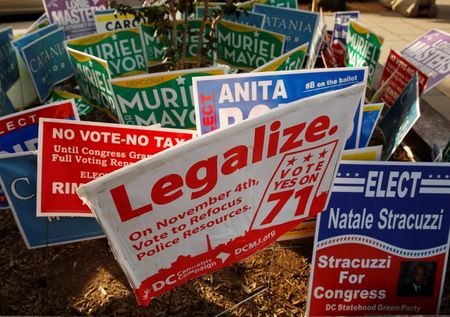By Ian Simpson
WASHINGTON (Reuters) - District of Columbia voters have overwhelmingly approved legalizing marijuana, but pot smokers in the U.S. capital still need congressional approval before they can legally light up.
Washington voters passed Initiative 71, 65 percent to 28 percent on Tuesday, joining Oregon and Alaska in victories that add fuel to the pot legalization movement.
But Congress, which has constitutional oversight of the U.S. capital city, can disapprove a measure within a review period of 30 business days. The president must also approve Congress' action to stop the initiative from becoming law.
Bill Piper, head of national affairs for the Drug Policy Alliance, which backed Initiative 71, said he was confident the new Congress elected on Tuesday, which will take office in January, would not oppose it.
"We're still not that worried about Congress. They'd have to pass something in the House and Senate and it would have to be signed by the president, and that would be incredibly difficult within 30 days," he said.
Initiative 71 allows people over 21 to possess up to 2 ounces (56 grams) of marijuana and to grow up to six plants at home. It does not provide for sales, but the District Council is weighing a measure that would tax and regulate marijuana.
The law would not apply to the extensive federal land in Washington, which includes many parks and the National Mall. It remains legal for employers to screen job applicants and workers for drug use.
The District already has one of the lightest U.S. penalties for pot possession. A decriminalization measure that went into effect in July mandates a $25 civil fine for possession of up to an ounce (28 grams) of marijuana.
BEACH BOYCOTT
Initiative 71 faces at least one likely opponent in Congress, Republican U.S. Representative Andy Harris of Maryland, who says easing marijuana laws would boost drug use among teenagers.
"I will consider using all resources available to a member of Congress to stop this action," he said in a statement.
Harris, a physician, tried to stop decriminalization with an amendment that would block funding for the initiative.
The amendment failed to get through Congress and drew the ire of District officials, who urged vacationing residents to boycott beaches in Harris' district.
Backers have painted Initiative 71 as righting a civil rights wrong. A study by the American Civil Liberties Union showed that black people made up 90 percent of District marijuana arrests even though non-blacks used pot at similar rates.
Michael Weeks, 59, a university administrator who voted for legalization, said marijuana possession was a minor offense that took up too much police and court time.
"Seems like a better use of public resources," he said.
Supporters are optimistic about Congress, as the Republican-controlled House of Representatives has passed five laws allowing states to regulate marijuana.
U.S. Senator Rand Paul of Kentucky, the ranking Republican on a subcommittee with oversight over the District, told Politico on Tuesday he opposed any effort by Congress to block implementation of Initiative 71.

In July, the White House also warned Congress to leave the District of Columbia alone on legalization.
(Reporting by Ian Simpson; Editing by Doina Chiacu)
